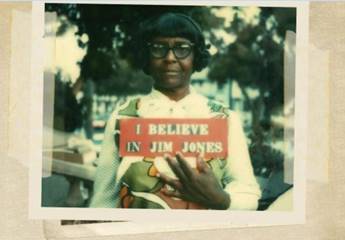Guest Article #6 – Bruce Hood
I’m extremely pleased and excited that Bruce Hood has agreed to write an article for Skepchick, because his book Supersense is my current number one must-read for skeptics. The reason for that is simple: it has much-needed insight into our sense of the supernatural and a position that skeptics don’t always acknowledge – that ‘woo’ thinking is innate. If you want a taster of Bruce’s research and a great overview of the book, check out the recent Little Atoms interview here. Bruce’s Skepchick article “Who Put the Woo in Woomen?” is after the jump.
Who Put the Woo in Woomen?
Professor Bruce Hood
I just discovered the skeptical community when I recently embarked on promotion for my book. I confess that this community had been much of a mystery to me, as I had not been paying attention to the growing body of non-scientists interested in critical thinking. What surprised me the most was how many enthusiastic young females played a prominent role in this movement. I guess I harboured the stereotype of the opposite profile, namely curmudgeonly old males. It is not too surprising when you take a look at the various atheist sites where lurks a particular breed of angry male, who seems to thrive on logic sandwiches of sarcastic and semantic nit-picking washed down with a cheeky bottle of vitriol.
I was also introduced to the term, “zombie crush,†where someone is admired more for their brains than their body. As a scientist for over 20 years, this is a refreshingly alien concept to me. So this growing community of female skeptics is great news for the scientific community where females are still under-represented (I should point out that in my field of experimental psychology, the undergraduate class is predominantly (>80%) female but the teaching staff is predominantly male).

But female skeptics are the minority among women in general. When I gave a talk at Skeptics in the Pub in London about why we believe in the supernatural, a young lady asked me, “Why do so many women believe in woo?†It’s true. It’s not a stereotype. Studies of various measures of paranormal and supernatural beliefs consistently find that women as a group score higher than males. That’s a fact. Are they more gullible? Are they less critical in their thinking? Let me put a few things out there that you might want to consider. And remember, these generalizations are just that – general points that speak to group differences between men and women.
To begin, psychologists distinguish between two types of reasoning that influence our beliefs and decisions. Sometimes simply called system 1 and 2 or intuitive versus analytical, they reflect the difference between a fast, largely unconscious reflection process compared with a slow, effortful logical analysis. Large studies of more than 3,000 Finnish students (where atheism is the dominant national position) by Marjaana Lindeman reveal that belief in the supernatural is linked to the extent to which an individual relies on intuitive thought processes – you know the sort of thing that Malcolm Gladwell writes about in ‘Blink.’ But it is not related to the individual scores on analytical thinking. I interpret this to mean that as individuals, we operate with both modes of thinking but the extent to which we rely on intuition reflects our general tendency towards supernatural belief.
But it can’t all be down to individual differences. This is maybe where the community comes in. Sam Harris (one of the younger, curmudgeonly old males) recently published an intriguing brain imaging study that showed that we don’t like to disagree with other people’s beliefs as it activates punishment centres in the brain whereas pleasure centres are activated by agreement. As a social species, we are inclined to believe what others tell us. And who are the more empathetic and social members of the tribe? Woomen, of course.
BTW lest we forget, we are all woomen initially, and if you don’t believe me ask yourself, “Why do men have nipples?â€
About Bruce
 Bruce is Director of the Bristol Cognitive Development Centre and holds a chair in the experimental psychology department at Bristol University. He took an undergraduate degree at Dundee University and a Ph.D. at Cambridge. He was a visiting scientist at MIT and associate professor at Harvard. He started his graduate work on low level vision and has been gradually working his way up the central nervous system from the senses to perception to cognition to belief. Now he experiments with the soul – or at least, belief in it. Bruce likes supernatural horror movies and is still a big kid.
Bruce is Director of the Bristol Cognitive Development Centre and holds a chair in the experimental psychology department at Bristol University. He took an undergraduate degree at Dundee University and a Ph.D. at Cambridge. He was a visiting scientist at MIT and associate professor at Harvard. He started his graduate work on low level vision and has been gradually working his way up the central nervous system from the senses to perception to cognition to belief. Now he experiments with the soul – or at least, belief in it. Bruce likes supernatural horror movies and is still a big kid.





Hey that was me who asked him that! You answered it in the least mysoginistic way I have ever heard :-)
*Thumbs up*
Tut, tut, Carmen. You completely forgot to pimp your blog post on that Skeptics in the pub meeting: http://carmenego.blogspot.com/2009/06/inimitable-bruce-hood-why-we-believe-in.html!
Haha, it would appear from that url that we all believe in html (as we rightly should)
Cheers for the plug ;-)
Actually, I should correct that, as I’m now blogging at wordpress: http://carmenego.wordpress.com/2009/06/23/the-inimitable-bruce-hood-why-we-believe-in-the-unbelievable/
I seem to recall it being brought up in every discussion relating to this that CT-ers, bigfoot-believers and such are predominantly men. I’m not a psychologist, so instead of embarrassing myself I’ll just be inquisitive and say: What’s up with that?
@Bjornar: I agree, there does seem to be a split in gender and type of belief. Women seem to be alt med, “sympathetic powers” such as esp, etc, where men seem to be the techie or political stuff like CT, aliens. I guess Bruce touches on that in his article, women generally are more empathetic so perhaps are likely to believe in stuff that gels with nurturing and relationships between people where men are more detatched?
However, I do note that Bruce cites studies which show women as a group are the paranormal/supernatural thinkers. What we need is a breakdown of the categories of belief and their gender scores. Maybe Bruce can help us out with that, I’d love to see some proof that the cliche of women believing in “soft woo” and men believing in “hard woo” is based in truth.
Tracy King said: “…Women seem to be alt med, “sympathetic powers†such as esp, etc, where men seem to be the techie or political stuff like CT, aliens…”
You hit the nail on the head. I just saw a TV commercial for “LiceMD” which triggered my BS meter. While Googling for the facts, reviews, etc. I came across mostly “mommy” blogs whose review consisted of restating the claims from the manufacturer’s website, along with “They sent me a free sample of LiceMD, etc. I haven’t had to use it yet, but nice to have in case my child gets lice, etc.”
That was the “review”!
Then there’s the whole anti-vaccination movement. Granted, it’s men who usually start these things (acupuncture, anti-vaxx, etc.), but the grass-roots movements that keep them going seem to be woman-driven.
As pointed out, big-foot, aliens, moon-hoax, etc. seem to be male-driven.
Considering the “going with the flow” attitude that apparently keeps woo beliefs running way past their expiration date, I suppose mommy-forums are THE place that incorporates that environment perfectly.
after all, who wants to upset the pregnant lady. Or the lady who just gave birth and hasn’t slept more than a few hours a night for weeks or even months on end. Which is in itself the perfect state of mind to just gobble up any claim thrown your way.
It’s like the perfect woo breeding ground.
One thing that always bothers me is the whole face cream market. Do I need to say more? Gah!
@autobahn: Ah. Interesting topic. I do not like the pseudoscience bullshit that goes with face cream marketing. However, I do have some sympathy for users, and in fact wrote about it here a while ago. The article is called “why expensive face creams work” and examines the retail/value perception psychology behind why spending more might actually encourage you to use the product compared to a cheap (but equally effective) alternative. Have a read if you’re interested: http://skepchick.org/blog/?p=1061
Of course, men’s beauty products are a growing market, so I guess vanity and the quest for perfect skin is universal after all :D
Thoughtful article and discussion. I’ll be on the lookout for the book.
@Tracy King: I think the “hard woo/soft woo” split is a false one. Woo is woo is woo. The idea that somehow alien abductions are somehow more “serious” than astrology is incorrect.
I sincerely doubt that women are more suseptable to woo than men. I think the “woomen” phenomenen is almost entirely down to comfirmational bias.
Our society ingenders in us a general impression than women are “dizzy” and we only notice “girly” woo when it fits our exsisting stereotype.
It’s more likely that the sexes are equally suseptable to woo but the way that suseptability is expressed in irrational beliefs is dictated by gender roles of what is acceptable.
@russellsugden: I didn’t mean to imply that “soft” is less serious than “hard”. I meant it as “emotional” or “nurturing” versus “technical” or “political”. I thought I’d made that clear but perhaps not.
@russellsugden: there are different types of woo and I don’t regard alien abduction or UFO as supernatural – just really implausible and not based on any reliable evidence. In contrast, phenomena I talk about are in priniciple contrary to natural laws (as we currently understand them) and that’s what makes them supernatural – to be true we would have to re-write the natural laws.
The gender difference is well established in the literature and this is mostly based on self-report so confirmation bias cannot explain it. There is only one study that finds no difference
Finally, men and women do differ in their beliefs with women more likely to believe ESP, pre-cognition, ghosts, hauntings and men more likely to believe in UFO’s (which as I have already argued is not necessarily supernatural)
here’s a link to a review paper I found.
http://www.aiprinc.org/para-ac05_Irwin_1993.pdf
It is published in the Journal of the American Society for Psychical Research which may raise a few BS detectors but I think the meta-analysis is legitimate.
@Bruce Hood: This is what I ment to say, drawn as a direct quote from the paper you linked to,
“…The apparent sex differences in endorsement of paranormal beliefs presumably reflect sexual stereotypes of some sort, but the nature of these has not yet been determined. Scheidt (1973)speculates that the different level of paranormal belief across the sexes is essentially a
product of more basic differences in attitudes to science and religion, that is, males have been socialized to take more interest in and to be better informed about scientific matters than about religious issues (Zusne & Belief in the Paranormal 9 Jones, 1982, p. 186). Other sex-linked characteristics, such as the structural
location of women in society (de Vaus & McAllister, 1987), nevertheless are worthy of further scrutiny in this context….”
What I should have said was “I think the perception of the “woomen†phenomenen is almost entirely down to comfirmational bias.”
I’m a little uneasy about the self-reporting part as surely people aren’t going to report any (or be less willing to report) superstitions they have that are contrary to the popular conception of their gender.
How could you distinguish between, for example, those men who genuinely don’t believe in astrology and those who do but are unwilling to admit to their belief in astrology because to do so may have the social stigma of being “girly”?
@russellsugden: Are Alien Abduction and UFO’s woo or just implausible?
Well, if we take the definition of woo as being events that are contrary to the laws of nature as we understand them (contrary to the laws of physics as we understand them) then as outside the realm of sci-fi traveling between the closest stars in less than, say, a couple of million years, would require traveling at speeds that at least approach the speed of light.
The laws of nature as we currently know them state that the amount of energy needed to travel anywhere near the speed of light is near infiniate, contrary to the laws of nature as we know them.
In short, to have traveled from outside our solar system, “Aliens” would have to have broken the laws of physics as we understand them.
Which makes Alien Abduction etc Woo.
You might want to put that in your book
@russellsugden: Okay, I know this is going off on a tangent, but I love talking sci-fi and I can’t resist.
You’re making a lot of assumptions. For one, why can’t aliens have traveled a couple million years to get here? Maybe the average lifespan of a grey is a billion years. Maybe they live in a mobile civilization like the one in Independence Day. Or maybe they have developed or discovered wormhole technology like in Contact. And then, of course, we’re talking about technology, so it’s entirely plausible that there are other methods of travel that we just have not thought of yet.
End tangent.
@banyan: Or maybe the traveled here on unicorns. Or maybe they used the Spice from Dune to bend space. Or maybe they used Warp drive.
I’m not sure where I made any unreasonable assumptions.
Besides, as with all Woo, the claimant has to provide positive evidence for their claims. I don’t need to demonstrate why it’s impossible for aliens to have visited earth (although with a bit of physics 101 I could), the claiment has to provide evidence to back up their claims. By definition no reasonable could be provided to back up Woo.
I’d for one would love intersteller travel to be possible but I can’t let my desire for something to be true to blind me to the reality of physics.
Just because something can be imagined doesn’t make it possible let alone plausible.
http://en.wikipedia.org/wiki/Faster-than-light
@russellsugden You quote Zusne & Jones which is funny as they make the same point I do about UFOs in their textbook on anomalistic psychology and like a number of physicists (Micho Kaku) do not dismiss offhand the possibility of alien travel. I did say it was highly implausible.
I agree that culture could influence belief systems and account for these gender differences but that’s an empirical question isn’t it? I think I was quite clear in my original post that I was just putting a few things out there to consider.
I am never so certain as to proclaim that I am undoubtedly correct. That’s what being a scientist entails. Generating hypotheses and then testing them.
Unfortunately the book is already written so I am unable to add your analysis but I would be very interested to hear your opinion on any other content in it.
@Bruce Hood: I would be very impressed with the hypothesis and experiment that overthrew relativity. There’d certainly be a Nobel prize for somebody in that.
Of course a “Popperian” understanding of science can not exclude the possibility relativity being amended at some point in the future, but then I also can’t exclude the possibility of “Intelligent Design” as highly implausible as it is.
I’m sure there are some biologists who believe in intelligent design and some doctors who believe in homeopathy, my rejecting what they believe to be plausible does not make me unreasonable.
The general consensus is that FTL violates Relativity. The level of plausibility of FTL being possible is comparable to the level plausibility of ghosts exsisting or astrology being true (which as the gravitational effects of the planets are present across the universe is one of the more plausible forms of woo)
Perhaps I’m not grasping your definition of highly implausible. Where do you put UFOs? It’s highly implausible that I am secretly the true king of England is that more or less plausible than red-neck anal probing aliens?
I think some people (not me) might argue that you are claiming UFO’s to be “not woo” because its generally men that believe in them, whereas astrology is “woo” because its something women generally believe in.
And there’s a world of difference between an astro-physist accepting the vanishingly small possibility of FTL and UFO nut claiming alien visitation of the earth.
And I’ll get your book out of the library as soon as I can and give it a read.
I have to admit that my own preconceived notions of biological parity between the sexes make it very difficult for me to accept that one sex is more suseptable to woo than the other.
I’m firmly, but not irrationally, convinced that any differences between the men and women in terms of reported woo belief is due to their upbringing and culture (or the culturaly bias of the scientists invenstigating what they themselves consider to be woo) rather than arising from some innate biological differences between the sexes.
It’s likely I could be wrong, because I “want” men to belive in woo just as much as women.
The male/female differences seem self-evident once you accept the intuitive vs. analytical thinking differences.
Conspiracy theories and the like take a remarkable amount of analytical thinking. Look at the 9/11 truthers, for instance. They have to pore over piles of pictures, documents, etc., analyzing apparent connections, and “uncovering” the various schemes. Except for the occasional personal experience, most UFO believers follow the same pattern. Sure they reach the wrong conclusions, but they’re still using that “side of their brain.” They still have “facts” on their side.
I’d definitely like to find out if men believe in these things with the same frequency as women believing in the others.
The “disagreement activates punishment centres” rang a bell with me. I just got back from a morning tea with a coworker who went to see Dr Phil “live” last night. I wanted to go into a spiel about what a douche he is, but couldn’t bring myself to do it.
A little more “I take full responsibility” and less “I have an excuse” might get us further. At the risk of sounding preachy, equality isn’t a right. It’s a responsibility. It means someone can’t say you can’t do something because of your gender, and that also applies to you.
This may or may not be true, but I don’t think it matters. For my part, I don’t buy it. At the very least, it’s a cultural bias and not gender based, but my guess is it’s probably bogus. Either way, you buy into woo because you fail to think properly about the evidence, not because of any predisposition. We’re conditioned at an early age to believe that our elders are right about pretty much everything they say. That’s no excuse for believing they are all right when you’re an adult. It’s not going to win you any court cases anyway.
I get upset when someone does any study saying that men or women are more or less predisposed to do some things. Who cares? I’m more predisposed to doing some things than the person standing next to me, even if we’re both heterosexual white men with blond hair and beards and stunningly good looks. That’s not the friggen point.
Like russellsugden, I refuse to believe that any differences in susceptibility to woo between the sexes are biological in nature. I’m pretty sure it’s all upbringing.
If men really do use one side of their brain more than the other, it’s probably because they’ve been brought up to think that way because of the things they’ve been exposed to. As a result, any differences between the type of woo that manages to take hold of this brain and its way of thinking is also culturally dictated.
I think the main question then becomes, “is a brain brought up to think in the male way, more susceptible to woo than a female brain that’s been exposed to entirely different stimuli during its upbringing?”
And perhaps also the same point russellsugden was making:
Is what we perceive as being woo or not also coloured by our upbringing? If we are completely honest with ourselves, we have to concede that UFO-and-abduction-woo and Conspiracy-Theory-woo are just as unlikely and unsupported by facts as any of the touchy feely girly woo like astrology, ESP, ghosts, etc…
Likewise, homeopathy doesn’t get a pass simply because some of its followers are doing actual science trying to vindicate it. The woo part comes in when they continue to believe and endorse it even when their experiments have failed to support their position. It’s no more or less credible because it looks like science. As long as it isn’t actual science, it’s woo.
So it’s important to remove that bias before deciding if there really is a gender difference in susceptibility to woo.